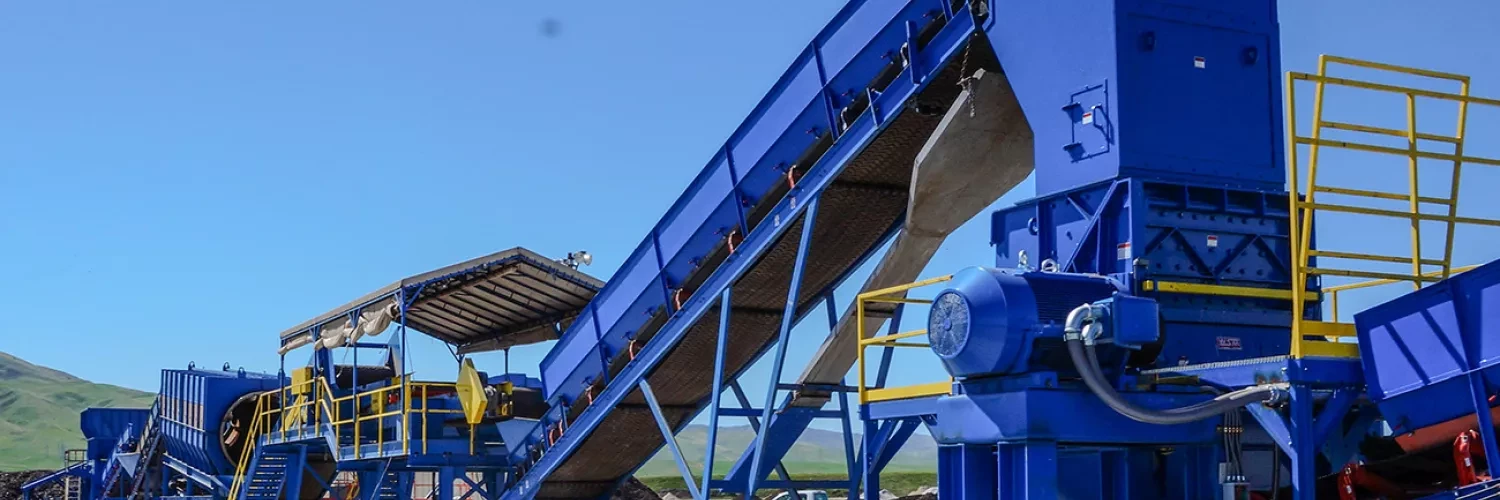Make more of waste: cutting-edge composting machinery converts mixed organics to high-quality compost
Converting organic waste into high-quality compost with industrial composting machines is one of the most sustainable strategies in waste disposal, and an effective tool in reducing reliance on landfill, enhancing food production and reducing carbon emissions.
Our industrial composting machinery has been specifically developed to improve the composting process, and ensure that food waste, green waste, manures and mixed organics can be converted into high-quality feedstock for composting and anaerobic digestion processes.
To compost or digest: a question of destination
There are two main biological treatments for stabilizing and effectively recycling organic waste, composting and anaerobic digestion (AD). Composting relies on the presence of oxygen, while AD does not.
Both composting and AD offer different advantages depending on what the food waste is being used for. For example, composting offers higher raw material conversion rates, but energy recovery is commercially feasible with AD. In composting, a nutrient and fiber-rich resource, compost, is created and the organic waste is stabilized enough for it to be used as a soil improver and fertilizer within agricultural settings and for land applications in general. However, the solid by-product of AD processing, the digestate, requires further processing, typically a composting process, to enable it to be used for land applications.
Whichever treatment method is used, we have the food waste processing technology and industrial composting machinery needed to support the recovery and recycling of organic resources.
Tighter regulations divert organic waste from landfill
Increased national, state and federal legislation dictates that more organic waste is diverted away from landfill, and at the same time, stipulates that only safe and environmentally beneficial compost is marketed.
For all industrial, large-scale composting and AD installations, converting organic waste material into a homogenous, process-ready feedstock is a vital step in industrial composting processes and food waste recycling. It requires field-proven equipment including our industrial compost grinders, food waste processors, compost screening and food waste grinders to process the most challenging organic materials as part of high-volume production lines.
Our WSM composting technologies and composting machinery reliably deliver a high-quality end product from extremely varied feedstocks. This ensures that they are in the best condition for onward processing and end use.
Reducing scraps to the same size
The size reduction of food scraps and other organic waste materials, as well as the screening of incoming and outgoing material for quality purposes, is required with most industrial composting systems.
Many conversion systems also require the addition of a bulking agent/carbon source (BA/CS) to recovered food. We have a focused approach to all industrial composting and AD installation requirements, and start with understanding the characteristics of each material to be processed.
All of our food waste recycling machines process organic waste differently and a key part to a successful system performance is understanding this, and offering dedicated industry, material and technology expertise with every equipment installation. Our ability to configure best-fit components or design and engineer a complete industrial composting processing system can help streamline new or existing operations.
WSM industrial composting technology, including market-leading food waste grinders, screening systems, and complete processing machinery production lines, convert these materials into feedstock for composting systems and AD installations. Our experience in processing a wide range of materials in the many industries that we serve, gives us a unique perspective and insight into the characteristic of processing certain materials. Our experience enables us to anticipate possible challenges and incorporate solutions in the initial phase of a project, ensuring that process efficiency and long-term sustainability are at the forefront of any delivery.
The best way to process high volumes of compost
- Industry specific information about: various food waste recycling solutions; industrial composting machinery, including entire production lines; and the processing and handling characteristics of organic waste and other materials.
- Lower processing, maintenance, and operating costs per metric ton ensured with very reliable, stationary, electric equipment, in comparison with portable systems.
- Able to handle a wide variety of raw materials: green waste, food waste, and mixed organics can be converted into high-quality feedstock for composting and AD installations.
- Streamlined organics processing with industrial composting solutions and complete systems that comprise feeding, screening, cleaning, sorting, and grinding.
If you have been looking for an improved, more consistent way of converting food waste, green waste, and mixed organics into high-quality feedstock and compost, WSM feeding, screening, and grinding systems may offer the solution.
 Bruks-Siwertell
Bruks-Siwertell
